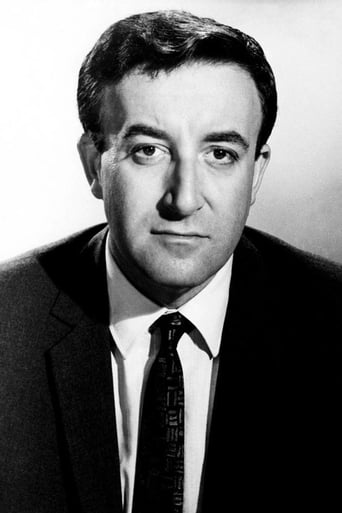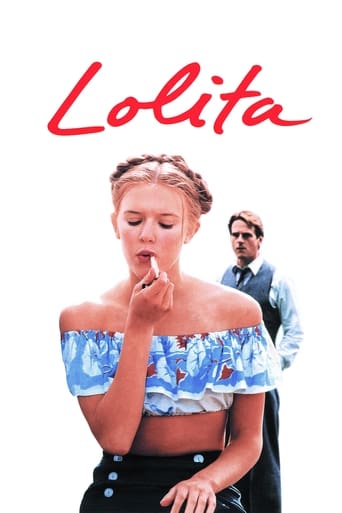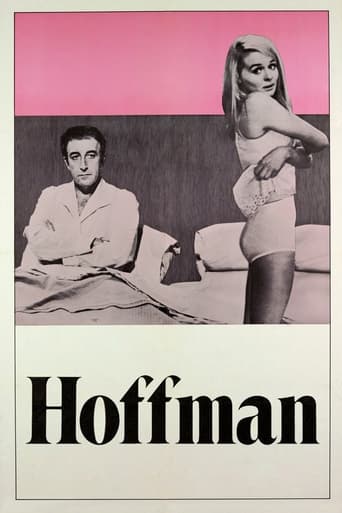
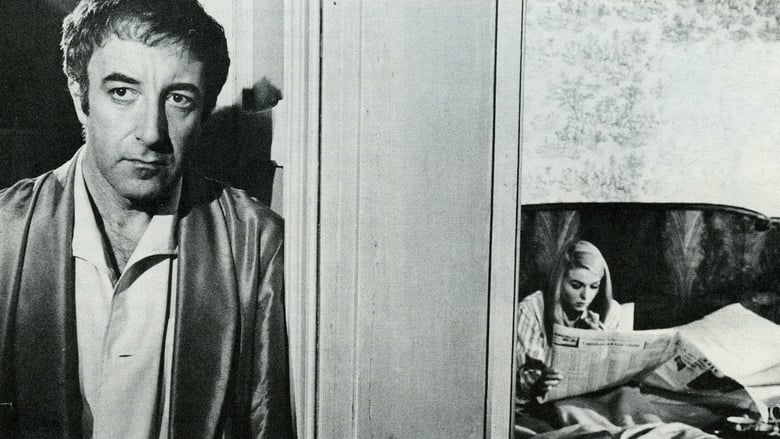
Hoffman (1970)
A businessman blackmails his young secretary into spending a weekend with him.
Watch Trailer
Cast
Similar titles


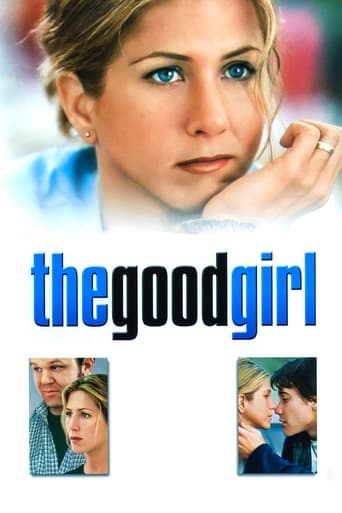



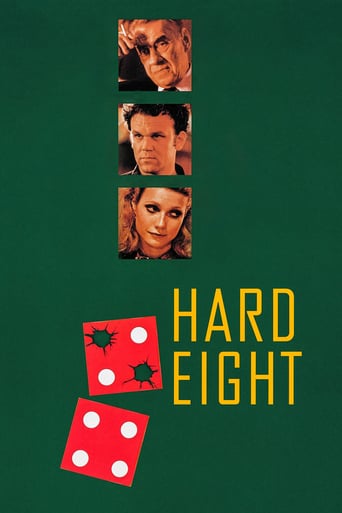
Reviews
It is not deep, but it is fun to watch. It does have a bit more of an edge to it than other similar films.
It's entirely possible that sending the audience out feeling lousy was intentional
A movie that not only functions as a solid scarefest but a razor-sharp satire.
An old-fashioned movie made with new-fashioned finesse.
I went into this not expecting much given that a lot of Sellers' output is somewhat dire. However, I was pleasantly surprised by this relativity unknown movie. Sellers plays an older man who is attempting to romance a younger woman by coercion. At the start of the movie we are not sure of the setup, Sellers ramps up the creep tension in the opening scenes, this is a long way from his usual slapstick but effectively done. I'm not sure Sellers is a good actor in the traditional sense, his expressions and speech are somewhat over-mannered, but it's effective in this setting. The target of Sellers' affection spends the first 30 minutes of the movie screwing up her face like a naughty 5 year old, but she is redeemed by her almost unbearable cuteness. Anyway, without giving too much away, she is forced into a choice. What transpires is quite interesting, in the context of the movie the decision she makes is assumed to be the correct one given the context, a happy ending as such. However, to the modern viewer the situation seems more morally ambiguous and the rationale implied somewhat self serving and narrow, who is exploiting who? An interesting movie for both Sellers' performance and as a time capsule of 60s morality.
Hoffman is nearly 40 years old now, but still, because of the Sellers name, people judge it as if it is supposed to be a comedy. It's not and was never intended as one. It's a portrait of a middle age man so damaged he can't love anymore, and so tries mightily to indulge in lust with a young girl, but he can't even do that correctly, because like all damaged people he was once a true romantic. Once he gets Mrs. Smith in his home, even though it's palpable he wants her sexually in the worst ways, he attempts to woo her – but not sappily; he wants to woo her with a destructive bent that is determined to prove that her love could never be honest since it can't accept anything but facile niceties. He wants to prove his own heart wrong. And if that sounds insane, then the complexity of love must have eluded you; you get old enough, you see how twisted and ugly and naked and needy the human heart really is. This is not a film with action (as if tons of quick cuts and explosions guarantee interesting). It's a Before Sunset type of film, with lots of interesting dialogue and little in the way of other people or the world intruding. The movie centers on two characters who are drawn to one another based on a deep seated pain. Sellers' Hoffman blackmails Mrs. Smith to spend a week with him -- but as I was watching it, I realized that Mrs. Smith had some pain and doubt in her heart just like Hoffman – she's just younger and it hasn't stung as deeply yet; and she must have sent him some signals before the blackmail, because attraction is usually a two way street. She ostensibly is there to save her fiancé from jail time (she and her fiancé and Sellers all work for the same company, but Sellers is an executive who has knowledge of thefts committed by the low-rung employee fiancé)– and her terror at first isn't faked – she's not a drama character being analyzed, she's a real person who is struggling with guilt at lying to her fiancé and fear at not being able to read Hoffman's emotions. But while her initial reactions and emotions aren't forced, they aren't all there is to her presence here, because her second try to leave reveals something more complex – she's trying to convince herself of outrage. Why would she go to all the trouble to dress and find the key to escape only to quit once Sellers sleepwalked her back to bed? She could have waited for him to fall back to sleep soundly – he does this easily. And why would she try to leave again anyway, knowing that the same horrible fate for her fiancé was still on the table? Because maybe she's running this time because something inside her, something dim but growing, doesn't want to run. As the week progresses, Mrs. Smith's frustration intensifies because, as she says, she had prepared herself for the worst things (sexual) and yet, Sellers' Hoffman does not do any of them. She lives in anticipation to get it over with mixed with a need to confirm that Hoffman is a base jerk – but that doesn't happen. He has some sweet moments, even though he's a misogynist in the way a single middle-aged man often is, and his insights into the darker nature of women ring correct (but he knows that they're not the whole truth and by trying to make them the whole truth, he's a bigger hypocrite than the female race he's condemning). This all plays out in a series of scenes so well acted by the principals that it should be taught in acting school to show young actors the beauty of subtlety on the big screen. Cusack is pitch perfect as Mrs. Smith and Sellers was never better than he was playing Hoffman – and this is high praise because Sellers wasn't just a gifted comedic actor – he was one of the best actors of his generation. Like all actors, he was a gun for hire, and he loved the limelight, and this lead to some bad choices. But who else could be Dr. Strangelove, Inspector Clouseau, and Chance Gardener? There's a moment near the end when Mrs. Smith calls him ugly, and the pain of her condemnation flashes over Sellers' whole body, he makes us understand all the sadness of this character in one brief, non-flashy, reaction shot. It's heartbreaking. It should be noted the direction here is excellent – it could have felt like a filmed play, but to me, it didn't. Sex Degrees of Separation and Closer – two films I enjoyed, feel like filmed plays to me. Hoffman, even though it uses one locale (Hoffman's apartment) as its primary set, always felt like a movie in and of itself while I was watching it. My only quibble is the ending. It needed to be darker. And in a movie like this, so predicated on characters and their fates, that would usually kill the experience for me. But it didn't. Because I wished these characters would find some happiness, so I went along with the fantasy, even though I knew the relationship as defined by the rest of the movie could never work. If you like Sellers, buy this one. If you like quality character driven dramas, buy this one. It's an unjustly forgotten gem.
This is at once one of Peter Sellers' least-known and more interesting vehicles; the film is virtually a two-hander with Sinead Cusack (daughter of actor Cyril and later Mrs. Jeremy Irons) as the young girl blackmailed by a middle-aged colleague (Sellers) into becoming his lover, because he knows of her boyfriend's involvement in a robbery.While the film is considered a comedy, it doesn't sound like it from that synopsis; it's really a character-driven piece on a serious theme mid-life crisis which has been treated several times over the years, though rarely in such perceptively intimate detail (for which it was deemed tasteless at the time). The humorous element (if one can call it that) springs from the fact that Sellers' character who had been fantasizing about Cusack for months doesn't have the courage to do anything with her once they're together! Incidentally, Hoffman's innately cruel nature was so similar to the real Peter Sellers that one might be inclined to think that his dialogue was improvised but this wasn't the case! With this in mind, the film can be seen as talky (though Ernest Gebler's script, adapted from his own novel, does contain a smattering of good lines), low-key and claustrophobic (the narrative strays only occasionally from Sellers' flat, and the two almost never interact with other people) not to mention repetitive and overstretched at 113 minutes! One particular sequence included an ambitious shot lasting for some 18 minutes, which certainly belied the rumors that Sellers had suffered brain damage during that infamous incident from the early 1960s in which he suffered no less than seven heart attacks in one day. The film's happy-ending-of-sorts, then, is highly improbable but I guess it works well enough in this context (given that Cusack's boyfriend is depicted as a one-dimensional character and, therefore, no match for the intellectual Sellers).Gerry Turpin's cinematography of the bleak London settings is one of the film's main assets, while the tone of romantic melancholy inherent in Ron Grainer's score and his Don Black-penned theme song, "If There Ever Is A Next Time" (sung by Matt Monro) infuses the whole film and even serves as exposition for the main narrative during its deliberately vague early stages. By the way, director Rakoff had already handled the same material as a TV production starring Donald Pleasance; at his own admission, the film version was too slow because the pace seemed to be dictated by the lead actor and professed to having misgivings also about the choice of music. As for Sellers himself, he was so disappointed with the final result that the star offered to buy back the negative from the producer and shoot it again from scratch (the film, in fact, was such a resounding flop that it wasn't shown in New York until 1982)!
Hoffman is another of the lonely middle-aged man pictures that Peter Sellers made during this period (1967-70), mostly, I think to prop up his fragile ego by co-starring him with young beautiful women after his marriage to Britt Ekland crashed. This one may contain the best Sellers performance of those movies (The Bobo-with Ekland-, I Love You, Alice B. Toklas, and There's A Girl In My Soup being the others), although it ultimately flops and leaves one with a feeling of dissatisfaction at the end. Sellers plays a business executive who blackmails his beautiful secretary into spending a week with him (he's got the goods on her and her fiance). The standout quality of the film is Sellers' brilliantly underplayed brooding madman, a man with a buried charm beneath a front of psycho-erotic fantasies. Even though the movie has moments of light comedy, one never fails to see the singularly terrifying quality of Sellers' obsession with the girl, either sexual or homicidal. He is marvelously ambiguous in the performance; when he massages the secretary's (Sinead Cusack) neck to work out a cramp, one is not quite sure if he won't crush her to death right there. Unfortunately, the movie follows the all-too-familiar plotline of these Peter Sellers movies. He is the unwanted one, the oddball, who frightens his female prey, until she sees his good side and warms up to him. It is nearly an inverse of The Bobo, where Ekland played the evil one and Sellers the innocent. The Bobo sets the audience up for a happy ending, then ends in a distasteful, unfunny joke. The only way to end Hoffman appropriately is for him to kill Miss Cusack. When the bedroom door closes behind them in the final shot, somehow we don't sense a 25th anniversary in store for this couple. It just isn't believable; why would she go back to this kook? Yet on some level it works, as symbolic of the limited choices for happiness among working class people. The problem is, in a movie, it doesn't work, because the audience is conditioned to responding to motives that are understandable, and everyone knows a beautiful young woman is always in the drivers' seat. The best thing about Hoffman is the supremely conditioned performance by Sellers, one of the world's greatest actors. I don't know if Miss Cusack can act; mostly she walks through the whole picture with that terrified little girl look on her face, but she is adorable. But like The Bobo, the ending undercuts the whole picture; after the script has set us up for strangulation, we get hearts and flowers, and its not a relief; it's a con and a disappointment. 2 1/2 ** out of 4
